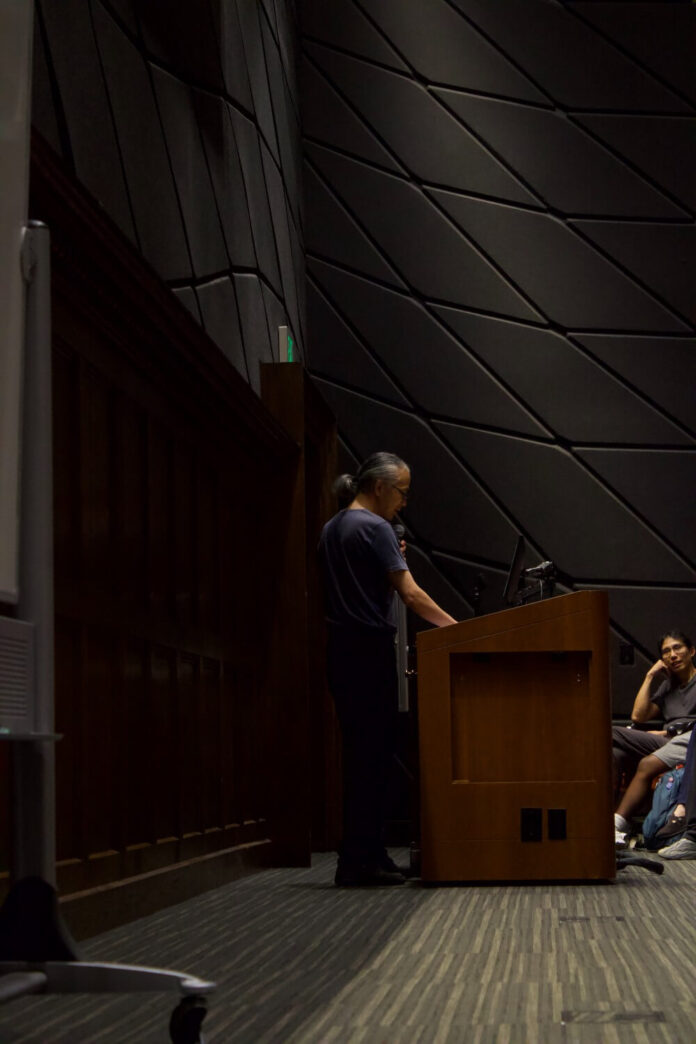
Ahead of science fiction author Ted Chiang’s talk on generative AI and art, Black Studies professor Yumi Pak hosted a screening of “Arrival”, the award-winning movie based on one of Chiang’s short stories. Staff writer for The Occidental Wura Ogunnaike conducted an interview with Chiang Sept. 23, a few hours before Chiang spoke to the Occidental community.

My first question is about the subject of your talk, generative AI and art. Why do you find it important to speak about this subject, especially in a college setting?
“Right now, we’re all getting a lot of messaging from big tech that their products can do everything that people can do. Weirdly, they have wound up targeting art as one of the first things that their products can supposedly do as well as people can. I feel like it’s important to push back against that because they are completely wrong about that. I think it’s important for everyone to know that big tech is full of it when they peddle this. It’s especially important for young people. Young people are getting the message that ‘before long, AI will be able to do anything that they can do’ and that can lead them to think that there’s no point. Or to wonder: ‘What is the point of studying or making an effort?’ That’s why it’s especially important for them to know that AI cannot do the things that Silicon Valley is claiming.”
What does making an effort look like to you in this day and age, especially with the massive amounts of messaging around AI?
“Education, in general, involves some degree of hardship or difficulty, without immediate reward. The fact that the reward is not immediate can make people feel like, ‘Why should [I] bother? ’
If you’re a student at a university, you should think of yourself as an athlete in training. You don’t know what sport you’re gonna compete in, [and] your professors don’t know what sport you’re gonna compete in. What your professors do know is that you need strength training. Strength training will help you in whatever sport you compete in. But strength training requires exertion; any useful exercise will require exertion. If someone is selling you an exercise program that requires no exertion whatsoever, you can be pretty sure you are not gonna benefit from it. The difference between physical training and cognitive strength training is how long it takes to see results. With physical strength training, you will see results fairly quickly, maybe in weeks. With cognitive strength training, you might not see results for a while. It might take months, it might take years. But the benefits are real, and that exertion will pay off.”
You’ve talked about how good art is the result of many small and large choices. Have you received any pushback on these ideas, and how would you respond to them?
“I’ve talked to some people in the tech industry who believe that the tools that they are building can be of genuine use to real artists. But I think that mostly, they are trying to please people who hire artists rather than the artists themselves. They are thinking in terms of productivity, which is not the priority for the artists themselves. You know, studio executives would like movies to be made faster, but [it’s] different for actual filmmakers; they have different goals. What I’m most interested in is what would help artists themselves, and I don’t think we know. I don’t think we’ve seen that yet.”
Do you think that is something that could happen in the future?
“I don’t think we’ve seen anything yet, and if anything like that does happen, I don’t think there’ll be a big announcement. I don’t think it’s compatible with a big announcement.”
What informs your writing? What are things that stand out to you and make you think something could be a good idea to incorporate into a story?
“Without getting into specifics, when I decide to write a story, it’s because an idea has been rattling around in my head for a long period of time, usually years. I’m not prompted to write a story by some current development; my stories are generally the result of something simmering on the back burner for a long time.”
Contact Wura Ogunnaike at ogunnaike@oxy.edu
![]()


































